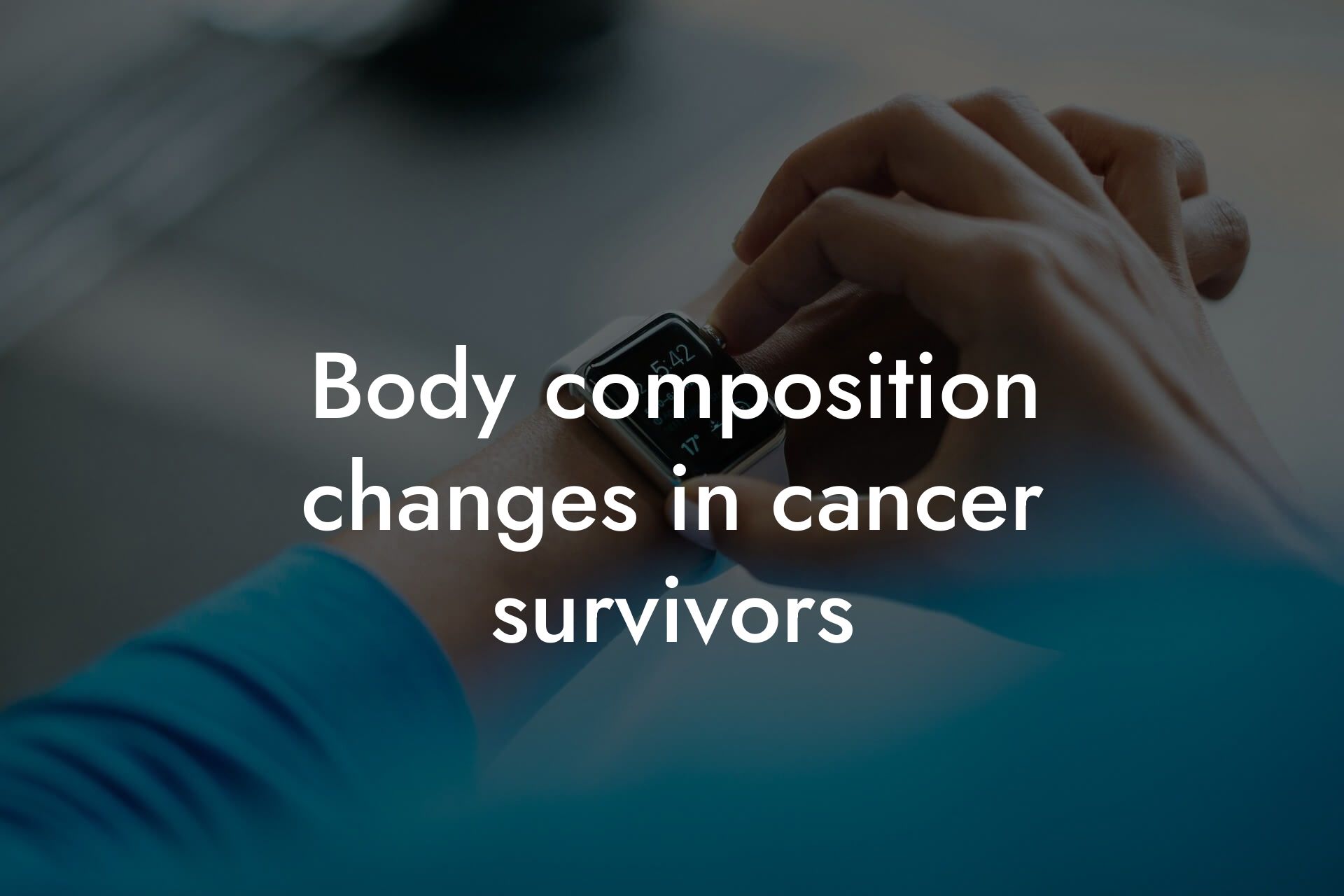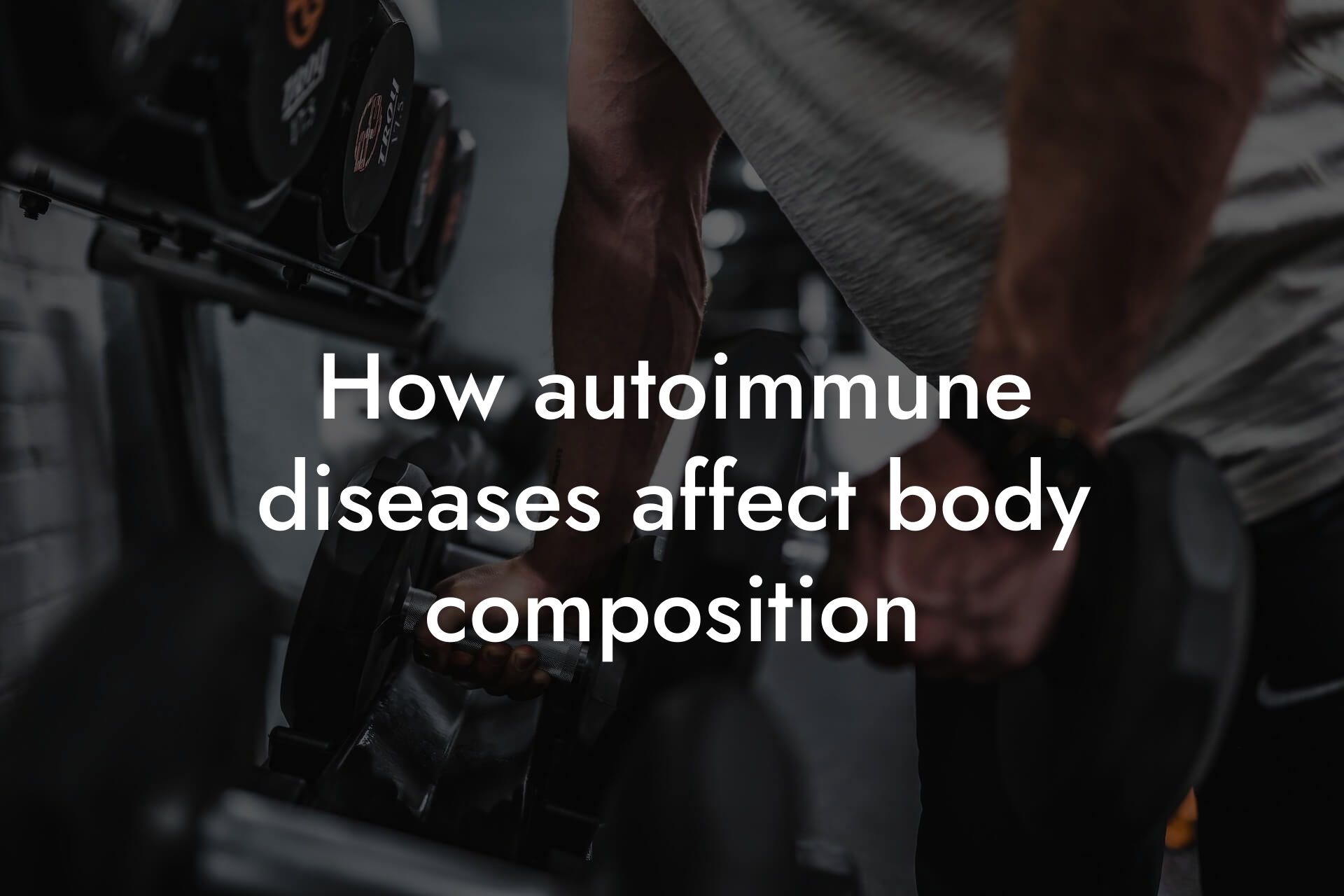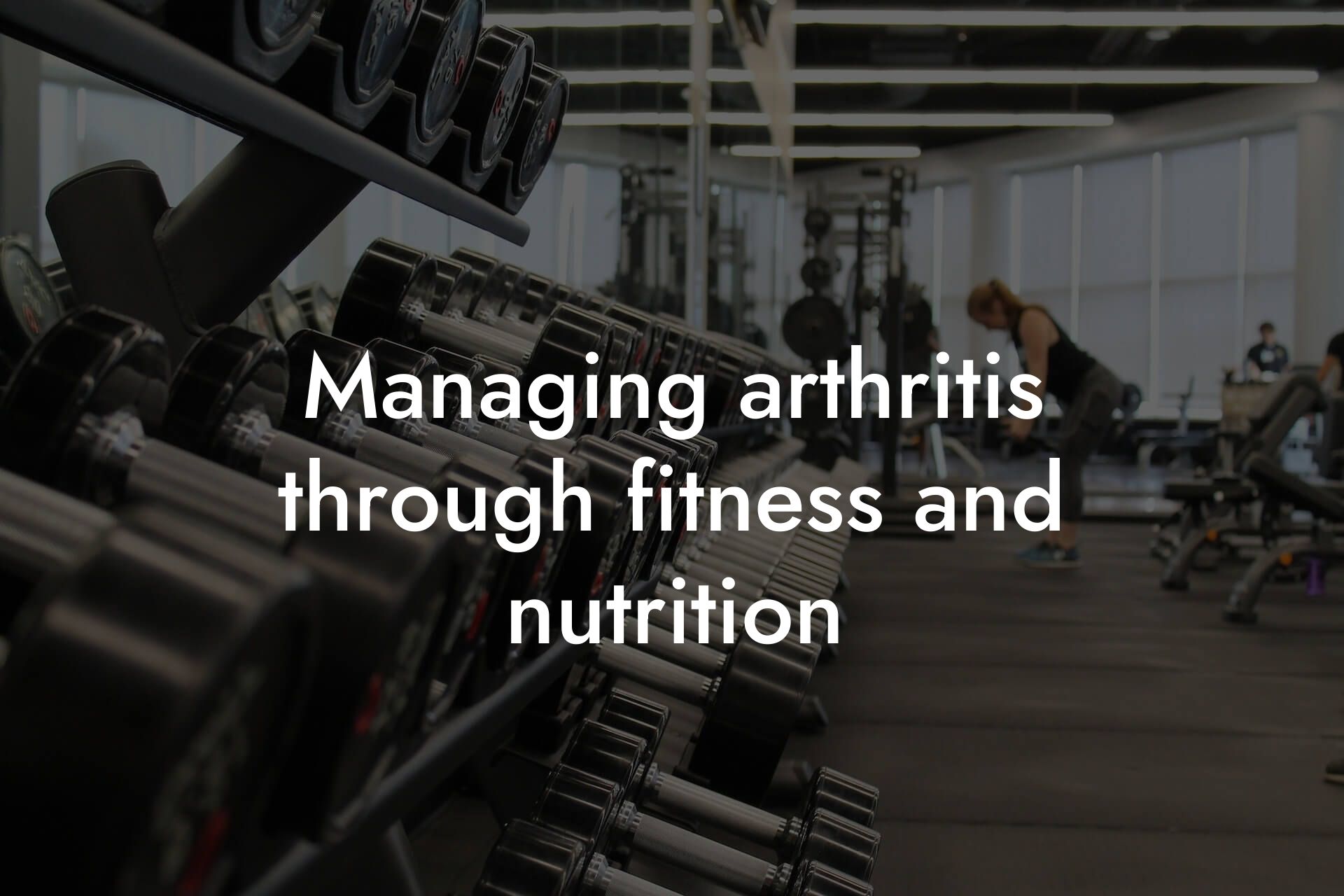As a high-earning professional, you understand the importance of maintaining a healthy and fit physique. However, when you have hypothyroidism, it can be challenging to achieve your body composition goals. Hypothyroidism is a condition where the thyroid gland doesn't produce enough thyroid hormones, which are essential for regulating metabolism, growth, and development. In this article, we'll provide you with a comprehensive guide on how to improve your body composition with hypothyroidism.
Table of Contents
- Understanding Hypothyroidism and Body Composition
- Dietary Changes for Improving Body Composition with Hypothyroidism
- Exercise and Physical Activity for Hypothyroidism
- Supplements and Vitamins for Hypothyroidism
- Stress Management and Sleep for Hypothyroidism
- Monitoring Progress and Adjusting Your Approach
- Frequently Asked Questions
Understanding Hypothyroidism and Body Composition
Hypothyroidism can significantly impact your body composition, leading to weight gain, increased body fat, and decreased muscle mass. This is because thyroid hormones play a crucial role in regulating metabolic rate, energy expenditure, and lipid metabolism. When you have hypothyroidism, your metabolism slows down, making it harder to lose weight and maintain muscle mass. Additionally, hypothyroidism can also lead to changes in body water composition, causing water retention and bloating.
Dietary Changes for Improving Body Composition with Hypothyroidism
To improve your body composition with hypothyroidism, it's essential to make dietary changes that support your thyroid health and promote weight loss. Here are some tips:
Eat a balanced diet rich in whole foods, fruits, vegetables, lean proteins, and healthy fats. Focus on foods that are high in iodine, selenium, and zinc, which are essential for thyroid function.
Increase your protein intake to support muscle growth and maintenance. Aim for 1.6-2.2 grams of protein per kilogram of body weight from sources like lean meats, fish, eggs, dairy, and plant-based options.
Incorporate healthy fats like avocados, nuts, and seeds into your diet to support hormone production and satiety.
Reduce your carbohydrate intake, especially refined and processed carbs, which can exacerbate insulin resistance and weight gain. Focus on whole, complex carbohydrates like whole grains, fruits, and vegetables.
Stay hydrated by drinking plenty of water throughout the day to help with water retention and bloating.
Exercise and Physical Activity for Hypothyroidism
Regular exercise is crucial for improving body composition with hypothyroidism. Here are some tips:
Focus on resistance training exercises to build and maintain muscle mass. Aim for 2-3 sets of 8-12 reps for each major muscle group.
Incorporate high-intensity interval training (HIIT) to improve cardiovascular health and boost metabolism.
Aim for at least 150 minutes of moderate-intensity aerobic exercise per week to improve insulin sensitivity and weight management.
Include low-impact exercises like yoga or Pilates to improve flexibility, balance, and overall physical function.
Supplements and Vitamins for Hypothyroidism
Certain supplements and vitamins can help support thyroid function and improve body composition with hypothyroidism. Here are some options:
Omega-3 fatty acids: These anti-inflammatory fatty acids can help reduce inflammation and support thyroid function.
Vitamin D: Many people with hypothyroidism are deficient in vitamin D, which is essential for immune function and overall health.
Selenium: This essential mineral is crucial for thyroid function and can help reduce inflammation.
Ashwagandha: This adaptogenic herb can help reduce stress and anxiety, which are common in people with hypothyroidism.
Stress Management and Sleep for Hypothyroidism
Chronic stress and poor sleep can exacerbate hypothyroidism and make it harder to improve body composition. Here are some tips:
Practice stress-reducing techniques like meditation, deep breathing, or yoga to manage stress and anxiety.
Aim for 7-9 hours of sleep per night to help regulate hormones and metabolism.
Establish a relaxing bedtime routine to improve sleep quality and duration.
Monitoring Progress and Adjusting Your Approach
To improve body composition with hypothyroidism, it's essential to monitor your progress and adjust your approach as needed. Here are some tips:
Work with a healthcare professional to monitor your thyroid hormone levels and adjust your medication as needed.
Track your body composition using a DEXA machine or other methods to monitor changes in body fat, muscle mass, and bone density.
Keep a food diary or use a tracking app to monitor your diet and identify areas for improvement.
Adjust your exercise routine and intensity based on your progress and how you're feeling.
Improving body composition with hypothyroidism requires a comprehensive approach that includes dietary changes, regular exercise, stress management, and supplements. By following the tips outlined in this article, you can take control of your health and achieve your body composition goals. Remember to work with a healthcare professional and monitor your progress regularly to ensure you're on the right track.
At Tano Performance Group, we understand the importance of achieving your body composition goals. Our DEXA machine provides a comprehensive body assessment, giving you the information you need to take your physique to the next level. Contact us today to learn more about our services and how we can help you achieve your goals.
Frequently Asked Questions
What is hypothyroidism and how does it affect body composition?
Hypothyroidism is a condition where the thyroid gland doesn't produce enough thyroid hormones, which are essential for regulating metabolism, growth, and development. This can lead to weight gain, fat accumulation, and changes in body composition. People with hypothyroidism often experience increased body fat, particularly around the midsection, and may struggle to lose weight despite following a healthy diet and exercise routine.
Can I still achieve my fitness goals with hypothyroidism?
Absolutely! While hypothyroidism can present some challenges, it's not a barrier to achieving your fitness goals. With the right guidance, nutrition, and training, you can improve your body composition and reach your desired physique. It may require more patience, persistence, and attention to detail, but it's definitely possible.
How does hypothyroidism affect my metabolism?
Hypothyroidism slows down your metabolism, making it harder to lose weight and maintain weight loss. This is because thyroid hormones play a crucial role in regulating metabolic rate, and when they're in short supply, your metabolism slows down. This can lead to weight gain, fatigue, and decreased energy levels.
What are the common symptoms of hypothyroidism?
Common symptoms of hypothyroidism include fatigue, weight gain, cold intolerance, hair loss, dry skin, constipation, depression, and muscle weakness. Some people may also experience memory problems, mood changes, and decreased libido.
How does exercise impact body composition with hypothyroidism?
Exercise is crucial for improving body composition with hypothyroidism. A combination of resistance training and high-intensity interval training (HIIT) can help increase muscle mass, boost metabolism, and enhance fat loss. However, it's essential to work with a qualified trainer or coach who understands the nuances of hypothyroidism and can design a program tailored to your needs.
What is the best diet for improving body composition with hypothyroidism?
A hypothyroidism-friendly diet should focus on whole, nutrient-dense foods, including lean proteins, healthy fats, and complex carbohydrates. Aim to include foods rich in iodine, selenium, and zinc, such as seafood, Brazil nuts, and oysters, which support thyroid function. Avoid processed and high-sugar foods that can exacerbate inflammation and slow down metabolism.
How important is sleep for body composition with hypothyroidism?
Sleep is crucial for overall health, including body composition. Aim for 7-9 hours of sleep per night to help regulate hormones, including thyroid hormones, and support muscle recovery and growth. Poor sleep can disrupt hormone balance, leading to increased body fat and decreased muscle mass.
Can stress impact body composition with hypothyroidism?
Yes, stress can significantly impact body composition with hypothyroidism. Chronic stress can disrupt hormone balance, including thyroid hormones, leading to increased cortisol levels, which can promote belly fat storage and decreased muscle mass. Engage in stress-reducing activities, such as yoga, meditation, or deep breathing exercises, to help manage stress.
How does medication affect body composition with hypothyroidism?
Medication, such as levothyroxine, can help regulate thyroid hormone levels, but it may not necessarily lead to weight loss or improved body composition. In fact, some medications can cause weight gain as a side effect. It's essential to work with your healthcare provider to find the right medication and dosage for your specific needs.
Can I take supplements to support body composition with hypothyroidism?
Certain supplements, such as ashwagandha, selenium, and zinc, may help support thyroid function and improve body composition. However, it's crucial to consult with a healthcare professional before adding any supplements to your regimen, as they can interact with medications or have adverse effects in certain individuals.
How long does it take to see improvements in body composition with hypothyroidism?
Improving body composition with hypothyroidism takes time, patience, and consistency. It's essential to set realistic goals and celebrate small victories along the way. With a well-designed training and nutrition program, you can start to see improvements in body composition within 6-12 weeks.
What role does hormone replacement therapy play in improving body composition?
Hormone replacement therapy (HRT) can help regulate thyroid hormone levels, which can, in turn, improve body composition. However, HRT should only be used under the guidance of a healthcare professional, as it can have potential risks and side effects.
Can I still build muscle with hypothyroidism?
Absolutely! While hypothyroidism can make it more challenging to build muscle, it's not impossible. Focus on a resistance training program that targets all major muscle groups, and ensure you're consuming sufficient protein to support muscle growth and repair.
How does hypothyroidism affect bone density?
Hypothyroidism can lead to decreased bone density, particularly in women, due to the impact of thyroid hormones on bone metabolism. This can increase the risk of osteoporosis and fractures. Engage in regular weight-bearing exercise and ensure adequate calcium and vitamin D intake to support bone health.
Can I still achieve a six-pack with hypothyroidism?
Achieving a six-pack requires a low body fat percentage, which can be challenging with hypothyroidism. However, with a well-designed training and nutrition program, it's possible to reduce body fat and reveal the muscle definition you've worked hard to achieve.
How does hypothyroidism affect my energy levels?
Hypothyroidism can lead to fatigue, decreased energy levels, and a general feeling of sluggishness. This is due to the impact of thyroid hormones on metabolism and energy production. Engage in regular exercise, prioritize sleep, and focus on a balanced diet to help boost energy levels.
Can I still participate in high-intensity activities with hypothyroidism?
Yes, you can still participate in high-intensity activities with hypothyroidism, but it's essential to listen to your body and pace yourself. Start with lower intensities and gradually increase as your body adapts. It's also crucial to work with a qualified trainer or coach who understands your specific needs and limitations.
How does hypothyroidism affect my mood?
Hypothyroidism can lead to depression, anxiety, and mood swings due to the impact of thyroid hormones on neurotransmitters and mood regulation. Engage in stress-reducing activities, prioritize sleep, and focus on a balanced diet to help support mental health.
Can I still achieve my fitness goals if I have Hashimoto's disease?
Hashimoto's disease is an autoimmune condition that can cause hypothyroidism. While it presents additional challenges, it's still possible to achieve your fitness goals with the right guidance, nutrition, and training. Work with a qualified healthcare professional and trainer to develop a personalized program that addresses your specific needs.
How does hypothyroidism affect my hair and skin?
Hypothyroidism can cause hair loss, dry skin, and other skin issues due to the impact of thyroid hormones on hair and skin health. Ensure you're consuming a balanced diet rich in omega-3 fatty acids, vitamin E, and other nutrients that support hair and skin health.
Can I still get lean with hypothyroidism?
Yes, you can still get lean with hypothyroidism, but it may require more patience and attention to detail. Focus on a balanced diet, regular exercise, and stress management to support fat loss and lean muscle growth.
How does hypothyroidism affect my overall health?
Hypothyroidism can have a significant impact on overall health, increasing the risk of cardiovascular disease, type 2 diabetes, and osteoporosis. It's essential to work with a healthcare professional to manage your condition and reduce the risk of associated health problems.
Here are some related articles you might love...
- Body composition changes in cancer survivors
- How autoimmune diseases affect body composition
- Managing arthritis through fitness and nutrition
- Understanding metabolic syndrome and its impact on health
- How diabetes affects body composition
- The impact of chronic kidney disease on body composition
- How to reduce the risk of heart disease through body composition
- The role of exercise in managing high blood pressure
- Managing cholesterol through diet and exercise
Zak Faulkner
Zak Faulkner is a leading authority in the realm of physical health and body composition analysis, with over 15 years of experience helping professionals optimise their fitness and well-being. As one the experts behind Tano Performance Group, Zak has dedicated his career to providing in-depth, science-backed insights that empower clients to elevate their physical performance and overall health.
With extensive knowledge of DEXA technology, Zak specializes in delivering comprehensive body assessments that offer precise data on body fat, muscle mass, bone density, and overall physique. His expertise enables individuals to make informed decisions and achieve their fitness goals with accuracy and confidence. Zak’s approach is rooted in a deep understanding of human physiology, combined with a passion for helping clients unlock their full potential through personalised strategies.
Over the years, Zak has earned a reputation for his commitment to excellence, precision, and client-focused service. His guidance is trusted by top professionals who demand the best when it comes to their health. Whether advising on fitness programs, nutritional strategies, or long-term wellness plans, Zak Faulkner’s insights are a valuable resource for anyone serious about taking their health and fitness to the next level.
At Tano Performance Group, Zak continues to lead our Content Team revolutionising how professionals approach their physical health, offering unparalleled expertise that drives real results.




